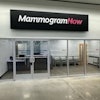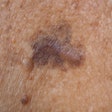The findings address a continued concern about breast cancer screening in younger women, presenter Dr. Maryam Etesami and colleagues noted.
"Appropriate starting age for mammogram screening has been a controversial subject in the recent years considering its potential harms and benefits," the group wrote.
Etesami's team assessed DBT's performance in women ages 40 to 54, reviewing 52,360 DBT exams performed between May 2012 and April 2018 and comparing the results among three cohorts of women: those ages 40 to 44, ages 45 to 49, and ages 50 to 54.
The group found the following:
- DBT's recall rate among women between the ages of 40 and 44 was 11.4%, 8.6% among women ages 45 to 49, and 7.5% among women ages 50 to 54 (p < 0.001), although the recall rate of baseline mammograms in each group was not significantly different.
- Differences in the cancer detection rate and the biopsy rate among the three groups were not statistically significant.
- 30% of invasive cancers found in women between the ages of 40 and 44 were invasive, compared with 17% of those found in women between the ages of 45 and 54.
The study findings suggest that using screening DBT in younger women is worth a higher recall rate, according to Etesami's group.
"The recall rate [of DBT] is higher in younger women, but recall rate of baseline mammograms is similar between three age groups," the team concluded. "Delaying screening may only shift higher recall rate of baseline mammograms to older women while losing the opportunity to detect aggressive cancers at early stage."



















